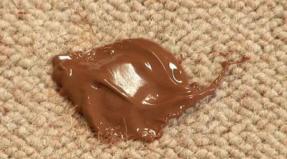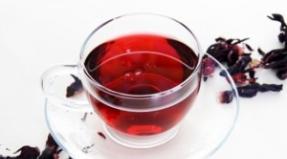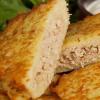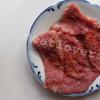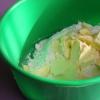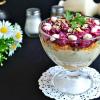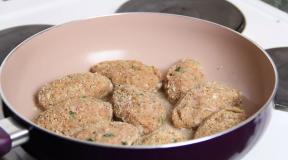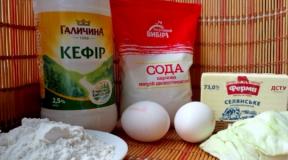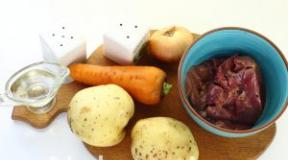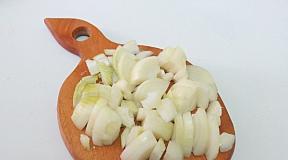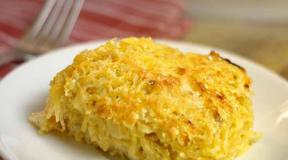What are the most useful yoghurts: names, list, brands, rating. What drinking yogurt, bioyogurt is the most useful, natural, high-quality: list, brands
Experts from Roskontrol have tested yoghurts of the most popular brands and found that most of them contain 100 times less beneficial bacteria, but significantly more sugar than indicated on the label, according to the organization's report on its website.
Experts of the non-profit partnership Roskontrol conducted a study of the most popular brands of yoghurts on the subject of safety, naturalness, usefulness and taste... They selected seven products for examination: Danone, BioMax, Landliebe, Miracle, Frugurt, Svala Organic and Valio.
As for beneficial lactic acid bacteria, in enough they were contained only in Svala Organic yoghurt. Products of other brands contained bacteria 100 times less than the norm indicated on the label (at the end of the shelf life of the product, the amount lactic acid microorganisms should be at least 1 * 10 ^ 7 CFU / g). Most likely, some of the bacteria died during heat treatment, to which producers have subjected yoghurts in order to increase their shelf life, experts say.
Manufacturers compensated for the lack of bacteria with dyes, thickeners, stabilizers and flavors. Most of them were found in Danone yoghurt, including modified starch E1442, stabilizers carrageenan E407 and xanthan gum E415, as well as acidity regulators, dyes and flavorings. In yoghurts BioMax and Chudo, four to five thickeners are used, while Svala Organic and Valio use only starch as a stabilizer.
Flavors were found in all brands without exception. Natural dyes available in all yoghurts except Valio. Synthetic dyes the experts did not find it.
According to experts, all these additives are considered safe, but they do not add benefits to the product, since the addition of starch increases its calorie content.
But the amount of sugar in all samples exceeds all allowable norms... The sweetest was BioMax yogurt (14.6%), one serving of which contains more than three teaspoons of sugar - this is about a quarter of the child's daily need for easily digestible carbohydrates. Least of all sugar contains Danone yoghurt- 3.25%. At the same time, experts discovered that the information on the label does not correspond to reality, for example, on the packaging of Svala Organic. it is indicated that 100 g of the product contains 10 g of sugar, but in fact - almost 40% more.
In accordance with the Technical Regulations of the Customs Union TR CU 033/2013 - Milk and dairy products, it is allowed that the discrepancy between the actual indicator ( mass fraction sugar) did not exceed 15%, the lawyer notes Alexander Borisov... “In this case, the producer of Svala Organic yoghurt may face the threat of violation of the requirements of the Technical Regulations under Art. 14.43 Administrative Code of the Russian Federation an administrative fine in the amount of 100 thousand to 300 thousand rubles ", - he sums up.
In this article, we will look at yoghurts and advise on which brand you should opt for. In this case, you will be completely sure of the naturalness of the product.
Fermented milk products, including yoghurts, play an important role in human health. By the way, yoghurts are the most popular and in demand for children and the elderly. But often the composition calls into question the "usefulness" of such a product. Therefore, this article will provide information about brands that deservedly receive the title of "useful".
What are the healthiest yoghurts: names, list, brands, rating
The main merit of any yogurt is the destruction of intestinal pathogenic microorganisms and the activation of beneficial microflora. Yoghurts also slow down the aging and decay processes. And, in general, they improve the functioning of the intestines and its entire system. Especially if it is weak or has some exacerbations. That is, the susceptible flora of an infant or diseases of the gastrointestinal tract of an adult.
Let's skip a moment with a detailed analysis of the composition of each known yogurt. But arm yourself with some guidelines to consider when shopping for yogurt.
What do you notice when reading the composition:
What yoghurts are at the top:
Important! None of the yoghurt manufacturers have ideal compositional characteristics. That is, to name the ideal or the most best yogurt it is forbidden. But it is possible to single out the indicators of certain brands that are closest to natural values.

The lowest score was scored Danone falls into a forbidden group. Among the advantages, only good taste and rich aroma.
- But this is merit a large number preservatives and stabilizers that are of chemical origin. A high percentage of dyes can cause allergies, and an acidity regulator is also observed. Therefore, the safety and naturalness of yoghurt is beyond the tolerance scale.
- But the main drawback is the low content of lactic acid organisms (almost 100 times lower than the permissible level).
- From positive qualities a high content of milk protein can be noted, but higher than the indicated data. But sugar, on the contrary, is lower. On the one hand, this is good, but it looks like cheating the buyer.
What drinking yogurt, bioyogurt is the most useful: names, brands, list
It is worth dispelling the myth that lactobacilli are somehow dependent on the density of yogurt. Regardless of the consistency, be it thick or liquid product, the bacteria in its composition will be in the same amount.



Natural yogurt without additives - how to choose which one to buy: the best brands
Natural yoghurts are the healthiest for the body. They have a number of requirements that will be provided below.
What you need to know when buying natural yoghurt:
- Shelf life Is the first indicator. Healthy yogurt retains its properties for no more than 1-2 weeks. Some manufacturers extend the time up to a month. When compared with other common yoghurts, then, most often, this period takes as long as 3 months, or even a year.
- Composition in natural yoghurt it is pleasantly small. Ideally, there should be only milk and bacteria, but this is extremely rare to find. Remember that a long line-up is a bad sign.
- Also consider - sugar should not be in natural yogurt!
- The content of lactic acid bacteria (at least 10 * 7 CFU / g) and bifidobacteria (at least 10 * 6 CFU / g) must be indicated. By the way, their quantity must be maintained until the end of the shelf life.
Natural yoghurts worth highlighting:



Low-fat, low-calorie yoghurts: which brand is better?
It is also worth noting that fermented milk products help the body to cleanse itself. Therefore, when consumed systematically, yogurt dissolves fat deposits, corrects body shape, removes excess feces and fights excess weight.
- "Valio" with a fat content of 0.4%. excellent quality, which is expressed in the absence of preservatives and high rates lactic acid bacteria. Very moderate sucrose content, which is important for low fat yoghurt.
- But the content of protein and SNF is several times less than the required content according to the regulations and GOST. The taste and aroma are subtle.
- Fermented milk drink It belongs to the category of low-calorie yoghurts, has a fat content of 1.5%. It is really low in calories and milk fat. Lactic acid organisms are normal.
- But the taste and aroma of yogurt is very weak, but dyes were taken in abundance. And there are no berries, that is, there is no filler or it is very weakly expressed.
- And keep in mind - yogurt is slightly high in sugar! Even for high calorie yoghurt.


Important! Sometimes manufacturers use potassium chloride instead of milk fat. It creates a salty and bitter taste, so they have to include more sugar in the composition.
- Yogurt "Slavushkin" from Optimal. He "stepped" far from the previous representatives in terms of naturalness. But it loses only in terms of nutritional value and taste.
- Bifidobacteria are present in the right amount... It is worth highlighting that sucrose is used for a sweet taste (in acceptable doses). There are no preservatives, which is an indisputable positive quality.
- But the taste of the yoghurt has become less expressive and a little mealy, which indicates the starch content.
- Please note! Low-calorie foods can be called useless, since they do not carry any energy value for the body. And to reduce the calorie content of the product, water and sugar are often used. Water destroys the consistency of the yoghurt and causes pathogenic flora to emerge. And in order to somehow "improve" the taste of such yoghurt, manufacturers add great amount Sahara. Its content even exceeds the dose of fatty yoghurts.
Live yogurt: brands, manufacturers
Live yogurt is a product that does not pass heat treatment... That is, it contains live lactobacilli or probiotics. Such a fermented milk product always contains live bacteria. The shelf life of such products is no more than 7 days. By the way, it is also called bioyogurt.
- Yoghurt "Live", natural. It has only milk and leaven. It is stored only 4 days after opening the can.
- "Asenyevskaya farm" classic yoghurt... The same pleasant composition - only two components and can only be stored for 4-6 days.
- "Kozelsky live" yoghurt. Again, only two components with a period of no more than 5 days.
- "Milk culture". This, by the way, drinking yoghurt, which also pleases with the composition.


- "Bifidus Nature"
- "Activia"
- "Bio balance"
And the best way is to make your own, homemade live yogurt. There is absolutely no doubt about its composition. The selection of starter cultures is plentiful today. Moreover, you can add pieces of your favorite fruit to such yogurt. By the way, due to the lack of heat treatment, it retains maximum usefulness. It will be really natural, because only you follow the components. And it will also be fresh, and this is an important criterion for the viability of beneficial bacteria.
Video: Which yogurt to choose?
Yogurt - healthy delicacy, is not it?
This wonderful product has conquered all the world markets.
But is it as useful as the girls in the commercials claim?
Delicious medicine or a storehouse of harmful additives?
The article there will be a speech about useful and harmful properties yogurt.
Yogurt is a product of fermented milk origin obtained by fermenting milk with special yoghurt bacteria.
V pure form yogurt has been known to mankind for more than 3 thousand years since the time of Ancient Babylon. The word "yogurt" is of Turkish origin, but its homeland is Bulgaria.
In Bulgaria, the most stringent requirements are imposed on its composition. Anything that contains dyes, additives, sugars, thickeners and powdered milk- in Bulgaria it cannot be called a traditional natural yoghurt. In Russia and other countries of the world, laws are milder, and manufacturers supply yoghurts to the market with the most various fillings... Approaching the window, eyes run up from such a rich assortment.
Today there are 3 types of yoghurts:
Yoghurts without flavors (natural yoghurt, consists exclusively of milk and sourdough)
Fruit yoghurts (with added fruits, syrups)
Flavored yoghurts (contain sugar and various flavors)
Of interest is the classification of yoghurts into the following 2 types:
Alive- contain live bacteria without added preservatives, shelf life cannot exceed 1 month.
Undead- give in heat treatment and conservation, stored for up to 1 year.
Yogurt: what are the benefits for the body?
High the nutritional value yoghurt makes it a product of medical and health food. It is difficult to overestimate their benefits, because yoghurts are rich in a whole spectrum nutrients:
Milk proteins
Vitamins (B2, B12)
Calcium
Carbohydrates
Living microorganisms
What are the health benefits of yogurt? Doctors recommend replacing a heavy light dinner yogurt. It is necessary to normalize intestinal activity and improve the digestion process. Proven that yogurt - best prevention bowel cancer. Yogurt effectively relieves the body and helps to feel light and get rid of unpleasant odor from mouth.
Its beneficial microflora stimulates immune system, why the body is able to attack various kinds of viruses and bacteria. Taking 300 g of yogurt daily, you will feel that diseases are bypassing you.
Yogurt stops aging! Lactobacillus and bifidobacteria dairy product cleanse the intestinal walls from harmful toxins. As you know, putrefactive processes pollute our body from the inside and contribute to accelerated aging.
Yogurt helps fight thrush. In the body, the number of bacteria responsible for the appearance of such an unpleasant disease decreases. Therefore, girls of reproductive age are especially advised to add yogurt to their diet and take care of their health.
Yogurt maintains proper blood cholesterol levels and improves brain function. American scientists in their studies have provided evidence of the dependence of the development of mental abilities on the intestinal microflora.
Dairy products affect the activity of the brain regions that are responsible for the emotional component of intellectual activity. Bad mood and depression? One more useful property yoghurt: pure organism and, as a result, pure thoughts.
Lactic acid bacteria help the absorption of calcium. Interestingly, 100 grams of the product contains more than 25% daily allowance calcium. And calcium means shiny hair, healthy teeth, clear skin, strong bones and muscles.
Yoghurts are a dietary aid! Studies conducted by American scientists prove that yogurt can help you lose weight faster. And this is not surprising, because the basis of any diet is an improvement in metabolism and proper bowel function.
Yogurt is an easily digestible product that does not cause allergies. People who are allergic to milk protein and lactose intolerant can include yoghurt in their diet and compensate for the calcium deficiency.
Another beneficial property of yogurt: yogurt - excellent cosmetic product... Yogurt masks are excellent at fighting skin flaking.
Who will benefit from yogurt?
Pregnant women and girls preparing for pregnancy
Host medications(especially antibiotics)
Living in areas of unfavorable ecological situation, where there is a high probability of contracting intestinal infections
Those who eat in crowded places (cafes, restaurants, canteens)
Working in hazardous industries
Immunocompromised people
For adolescents and seniors.
Any product has both indications for consumption and contraindications.
Natural yogurt should not be consumed if you have:
Acidic gastritis
Stomach or duodenal ulcer
Kidney disease
Diseases of the urinary tract
Yogurt: what is the harm to health?
Bright packaging of yoghurt, a flashy advertising slogan, exotic additives - this is undoubtedly a successful marketing policy of companies. But, as a rule, buyers pay attention to this. And few people think about what harm such a seemingly harmless product can cause to the body. It is known from chemistry lessons that fresh vegetables, fruits and berries upset the balance of the fermented milk environment. Unfortunately for natural ingredients give themselves away from thousands chemical additives... Manufacturers like to save money and buy cheap raw materials. It is much more profitable for them to give a flavored unnatural taste to a cheap product than to buy expensive ones. tropical fruits... Just think what harm they can do, because many of them are even used in the manufacture of paints and varnishes!
But that's not the worst part. Manufacturers often use flavor enhancers, which are the strongest and most dangerous carcinogens. Doctors associate the incidence of pancreatitis in the population with the constantly increasing use of preservatives in the manufacture of food.
Dentists have a negative attitude towards yoghurts, as they, like chocolate, caramel and juices, destroy tooth enamel... But to avoid harm to the oral cavity, you just need to rinse your mouth after eating and remember to brush your teeth 2 times a day.
Excessive use yoghurts containing 3 times the amount of sugar can cause serious harm to the body and lead to the development diabetes mellitus... Due to the fact that food tolerance is different for everyone, long-term use of yogurt can lead to the formation of kidney stones, flatulence and spasms in the colon. Therefore, it is better to consult your doctor if you should use this product, will it be useful or harmful for you, and whether your body has a predisposition to the development of the above diseases.
Calorie content of yogurt
The energy value of a product is called its calorie content. This is the amount of energy that is released in the human body from food during the meal. Nutritionists in many countries include yoghurts in the list of foods that help to lose excess pounds. Therefore, they are often called dietary. So how many calories are in yogurt? The calorie content of yogurt is determined by the fat content of the milk that is used as its basis. Calorie content finished product in the range from 100 to 250 kcal per 100 g. The calorie content of store yoghurts varies from 50 to 100 kcal. The more fillers yogurt contains, the more it is energy value... For example, the calorie content of natural yogurt with a fat content of 3.2% is 58 kcal per 100 g, and of yogurt with fillers - 100 kcal. And this is 2 times more!
Yogurt for children: good or bad?
It is not recommended for children under 9 months to include yoghurts in their meals. For the first year of life, the baby should receive only breast milk or formula. When choosing yogurt for a child in the store, be sure to pay attention to the expiration date of the product.
For a child, it is better to choose products with a fat content of up to 5% without fillers. Additives are harmful to the not yet formed gastrointestinal tract children. Most healthy yogurt stored for no more than 3-4 days and sold in stores specialized in dairy products. Such yoghurts are made from natural cow's milk, so they can be given even to the smallest. Each child is different, so you should still consult a pediatrician.
To this day, the question remains controversial: "Yogurt - which is more: benefit or harm?"
Some argue that the use of yogurt brings tangible health benefits, while others exclude it from their diet.
But remember for real useful product Is one that consists exclusively of natural ingredients... The fewer components contained in yogurt, the healthier it is. In order to avoid harm to your body and provide it with exceptional benefits, carefully study the composition, check the expiration date, the presence of dyes and preservatives contained in it. Alternatively, try to find a simple homemade yogurt recipe that you can be sure of. Take kefir, add jam, honey, muesli and your favorites fresh fruits... And your dessert is ready!
Yoghurt starter is intended for making live yoghurt at home. This yoghurt contains a high amount of live and beneficial bacteria. Does not contain any harmful additives and sugar. Sourdough yogurt can be consumed every day by adults and children.
Application possible
without fermentation
Can be used without fermentation
This starter can be taken in its pure form, as a probiotic, to restore intestinal microflora and normalize digestion.
Dilute the contents of the sachet in a small amount boiled water room temperature... Take 1 sachet 1-2 times a day, immediately after meals for 1-3 weeks.
detailed information
Yoghurt VIVO- a starter culture for making homemade yoghurt with your own hands.
Yogurt is perhaps one of the most famous fermented milk products, which has a very delicate and pleasant sour milk taste. Homemade yogurt recommended for daily nutrition, as it has a number of useful and nutritional properties, especially if dry bacterial starter culture VIVO is used for preparation.
VIVO yoghurt starter culture does not just ferment milk into yoghurt, but gives it a very useful features, because it contains a high amount of live probiotic bacteria. This yogurt helps to normalize the intestinal microflora and improve digestion, strengthen immunity, restore strength and normalize weight. Regular use helps to compensate for the lack of protein, calcium, vitamins, amino acids, minerals and trace elements in the body.
Natural sourdough yoghurt does not contain harmful additives, such as sugar, preservatives, dyes, flavors, etc. It is guaranteed fresh and safe, therefore it is ideal for human consumption of different ages, children, athletes, pregnant and lactating women, the elderly and everyone who follows a healthy diet.
VIVO sourdough yoghurt is excellent and natural alternative store-bought yoghurt that the whole family will enjoy.
Preparation
Homemade yoghurt is easy to prepare. For this preparation, you will need very little of your personal time, VIVO bacterial leaven, a saucepan or jar, a blanket or a large towel.
The starter culture should be added to milk at a temperature of +37 .. + 40 ° С (slightly warmer than body temperature) and mix well. After that, the container with milk must be wrapped in a blanket or a large towel to maintain the temperature and leave to ferment for 6-8 hours. After the yogurt is cooked, it should be put in the refrigerator to cool down. But you can eat right after cooking.
And if you have a yogurt maker or multicooker with a mode for making yogurt, then the fermentation process will be even easier.
Pan Cooking InstructionsInstructions for cooking in a yogurt maker
Multicooker Cooking Instructions
Bacterial composition
Composition Lactose
Streptococcus thermophilus
Lactobacillus delbrueckii ssp. bulgaricus
Lactobacillus acidophilus
Bifidobacterium lactis
The amount of bacteria in the bag is enough to guarantee the fermentation of 3 liters of milk (at the end of the ferment's shelf life).
Storage conditions and shelf life
In the refrigerator (at a temperature of +2 .. + 8)- 12 months.
Payment to current account: You can pay for the order to our account using your online banking, through the cash desk of any bank in Russia, as well as through a payment terminal.
It just so happened that yoghurts and curds are considered correct, light and healthy food... When asked which is more useful - a piece of lard or a jar of fat-free fruit yogurt.99 out of 100 people will answer: "of course, yogurt." No wonder, because marketing is actively using links to "living milk culture" and "lightness", packaging is decorated with berries, fruits and whole grains, and even in the names there are hints of health benefits, "activity" and "immunity".
However, if you ask the same person to choose between a slice of bacon and seven teaspoons of sugar, the choice will no longer be so straightforward. That much or even more sugar and other carbohydrates can be contained in one package of fruit yogurt, or curd. And if the data on the mass fraction of fat are put on the package so that everyone can see it, then the percentage of carbohydrates is hidden on the back of the package and printed in the smallest print.
To figure out how much sugar consumers of sweet yoghurts and curds receive, we conducted a study: we bought samples of all sweet curds and yoghurts with fruits and cereals in one of the Moscow supermarkets to see what they contained. If the same product was available in several variations with the same performance (for example, curd desserts with different kinds berries), then we limited ourselves to one sample. Natural products we did not take without added sugar and fruit fillers.
In the course of the research, a lot of interesting things turned out, and not only about carbohydrates. For example, if the packaging shows beautiful fruit and berries, this does not mean that they are necessarily included in the ingredients, instead of them there may be "flavors identical to natural." In most yoghurts, not only sugar is added, but starch is also added as a thickener. V long lists there are many unknown ingredients, but I would like to highlight one component especially - this is a milk fat substitute in curd mass"Blagoda" and curd cakes with raisins from the Dmitrov Dairy Plant. "Milk fat substitute" - or milk fat substitute - is a product made from vegetable oils, primarily palm and coconut. These oils are useful, but do not rush to rejoice - the composition of HMF contains refined oils that have undergone serious chemical processing, often hydrogenated, that is, containing toxic trans fats (about what trans fats are dangerous and how to recognize them on labels, we will write separately soon). It is impossible to determine from the data on the packaging whether HMF in curds contains trans fats, but the likelihood of this is very high. Considering that both of these products consist of almost a third (!) Of pure sugar, we highly recommend avoiding them not only for the followers of the method, but also for everyone who is at least a little dear to their own health.
We have compiled a table where you can see the amount of carbohydrates, including sugar, in the package of each product and their equivalent in teaspoons of sugar. For calculations, we took the weight of a teaspoon of sugar per 6 grams and rounded the "spoon equivalent" to half a spoon. Strictly speaking, sucrose does not make up the entire carbohydrate mass, but only 70-80 percent, the rest is starch, fructose syrup and milk sugar lactose. However, all these carbohydrates in the body are easily converted into glucose (and then into visceral fat).
Our conclusion: forget about all those sweet yoghurts, curds, curds and "light" desserts. They contain too much sugar and other carbohydrates. Buy whole and organic dairy products instead. And if you want to add fruit and berry flavor and aroma to them, then it is better to mix them yourself with fruits and berries. All other ingredients, including sugar and starch, are definitely not needed by you or your children.
